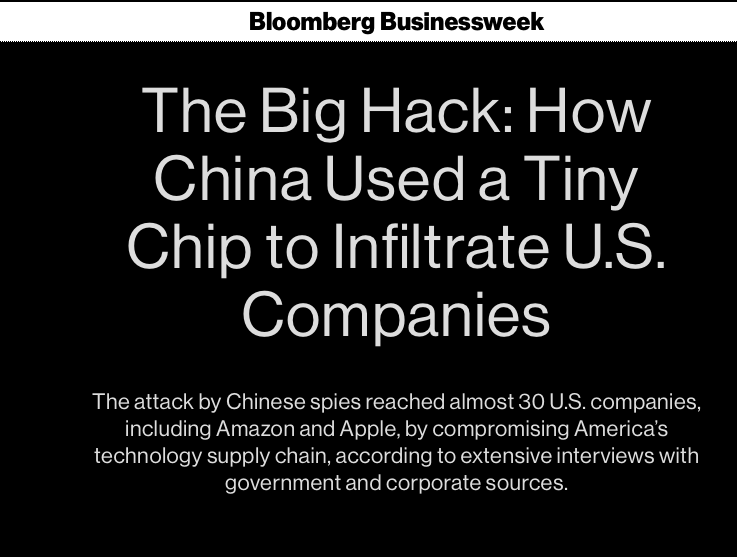“China’s Big Hack”: The US Has Its Own Reasons For “Saving the World” From China’s Supposed Big Tech Spying

If Bloomberg’s bombshell report is to be believed, then the US just blew the whistle on what might be the world’s most expansive espionage operation of all time, but America is exposing China at this specific moment three years after its hardware spying devices might have infected tens of thousands of motherboards in some of the main Big Tech companies because it hopes to leverage this jaw-dropping revelation to its favor in the global “trade war”.
Bloomberg took over the global news cycle earlier today after it published an extensive report titled “The Big Hack: How China Used a Tiny Chip to Infiltrate U.S. Companies”, which alleges that Chinese intelligence compromised the integrity of the global supply chain on which the country’s economy is dependent by clandestinely inserting hardware spying devices in tens of thousands of motherboards that eventually infected the likes of Amazon, Apple, the CIA, and many others. The piece deserves to be read in full in order to grasp the magnitude of what China’s being accused of and ultimately draw one’s own conclusions about the matter, but while it can’t be known for sure whether everything contained within it is true or not, it’s unquestionable that its publication at this point in time serves a tacit strategic purpose for the Trump Administration in its global “trade war” with the People’s Republic.
Uncovering The Conspiracy
Before getting to that, a concise summary of the report is in order. Basically, Bloomberg alleges that American intelligence became aware of what might be the world’s most expansive espionage operation in history sometime in 2015, after which it spent the next three years tracing the source of these hardware plants and uncovering the entire network. The outlet asserts that China inserted these miniscule rice grain-sized devices inside of motherboards being built in the country by Supermicro’s subcontractors, which in turn provided equipment to a company called Elemental that then sold its wares to Big Tech companies and some of the US’ military, intelligence, and diplomatic bureaucracies (“deep state”). Throughout the course of their investigation, the US security services secretly intercepted communications and relied on informants within the same supply chain that China had allegedly compromised, therefore compromising it yet again in its own way.
Screengrab from Bloomberg
It should have already been taken for granted that intelligence agencies were operating within the global supply chain, but the scale at which China supposedly was is unprecedented in terms of anything that had hitherto been made public, though one might cynically imagine that “another Snowden” might one day reveal much worse activity carried out by the US. That’s only in the realm of speculation for now, though, and not even the US’ enemies have accused it of doing what America is now saying that China is guilty of, though it’s probably not for a lack of trying. To be blunt, the US doesn’t have the opportunity to do what it says China did because it no longer builds much of the world’s technological products like the People’s Republic does, which means that the entire world is hypothetically at risk of being spied upon through these secret motherboard hardware devices.
The World’s Most Wide-Ranging Espionage Operation?
According to the report, Chinese intelligence wasn’t doing this to check out people’s iCloud pictures but to actively penetrate the world’s most influential Big Tech companies in order to steal their trade secrets. This narrative aligns with what the Trump Administration had previously warned about when it came to China’s 2025 policy of becoming the world’s economic superpower through its focus on high-tech industrial gains. In essence, the actual conspiracy being asserted is that China took advantage of its role as the “world’s factory” to plant spying devices inside of the hardware that some companies within its territory produced so as to informally advance a “Build-Operate-Transfer” (BOT) model whereby foreign firms built factories inside of the country, operated them as they liked, but unknowingly had their trade secrets transferred to China. According to this interpretation, China’s 2025 policy would be achieved by stolen intellectual property.
It’s impossible for anyone to independently corroborate this theory, but the very fact that Bloomberg’s piece was released at this particular point in time points to this being a “weaponized leak” by the US “deep state”. The report itself even says that the Pentagon invited a handful of Big Tech executives to a low-key gathering where they were encouraged to pursue commercial products for detecting hardware implants, which if true is proof of the close relationship between the “deep state” and the private sector that wouldn’t inconceivably also extend to the mass media too (as the coordinated attacks against Trump by the faction of the “deep state” opposed to him strongly suggest). Taken to its relevant conclusion, the same “deep state” that supposedly investigated this wide-ranging Chinese espionage operation might have ‘encouraged’ Bloomberg to run this piece after feeding it the relevant information needed to put it all together.
Mixing The Trade War With Infowar
That shouldn’t be taken to mean that everything contained within it is false, but just that the US has a self-interested reason for possibly “saving the world” from China’s Big Tech spying (however hypocritical it is to do so given its own extensive espionage operations) because of the grand strategic economic impact that it could have on the “trade war” dimension of the New Cold War between these two Great Powers. The innuendo is that none of the tech companies producing their wares in China are safe from this menace, thus meaning that the only “responsible solution” is for them to either re-shore their operations back to the US or whatever their home country may be or re-offshore them to any other cheap-labor country besides China. In parallel, there’s also a hint that China’s rapid economic rise might have been the result of earlier undetected espionage operations over the decades.
That second-mentioned narrative suggests that there’s nothing inherent in China’s communist economic model that predisposed it to success, which furthers one of Trump’s main ideological points that socialism supposedly always fails wherever it’s attempted. In this instance, China’s unofficial adaptation of what mostly relates to “state capitalism” in the production sense but might have “socialist” applications in the socio-cultural one combined with its unprecedentedly massive espionage operations over the years to build this Great Power behemoth, implying that the country is actually just a “paper tiger” that’s much more vulnerable to the US’ tariffs and the multilateral solution that America would prefer in leading a global exodus from China than many observers might have initially thought. That’s a very powerful weapon in the US’ infowar armory and one that’s sure to be used repeatedly in the coming months as Washington seeks to force Beijing into agreeing to new trade terms.
Concluding Thoughts
It evidently took three years for the US to uncover, trace, and neutralize what Bloomberg claims was China’s unrivalled Big Tech espionage operation before it felt safe enough having its “deep state” “leak” the details to the public as part of its Hybrid War on China. The strategic purpose is to malign the reputation of the People’s Republic by making it seem like Chinese intelligence is clandestinely spying on every company in the country in order to steal their trade secrets and then use them to crush its foreign “partners” through the China 2025 strategy of high-tech development. Not only that, but anyone who believes that this narrative is plausible would also naturally suspect China of doing the same with the New Silk Road, thus dealing a double whammy to the economic underpinnings of the People’s Republic if it contributes to a large-scale exodus of factories out of the country and a slowing down of the Silk Road.
The overarching objective that the US wants to attain is to cripple the economic structures on which China depends – namely its role as the “world’s factory” at the heart of the global supply chain and its export-driven economic growth through the Silk Road – so as to facilitate the clinching of a new trade deal with it that works out heavily to America’s favor. This is seen by the Trump Administration as being the easiest and fastest way to offset the paradigm-changing geostrategic challenges of the New Cold War that threaten to otherwise eventually unravel its unipolar hegemony. It’s therefore imperative for the US to press home the talking points mentioned in this analysis in order to pressure some of the Big Tech companies to take the lead in this hoped-for exodus, potentially coercing them under the threat of forthcoming sanctions imposed upon Chinese-built high-tech wares for national security reasons.
Should it succeed with this strategy, and it’ll admittedly take time to play out even in any substantial part because of how deeply embedded the world’s tech industry is in the Chinese-centric global supply chain, then the US might even be able to put an end to the New Cold War a lot sooner and peacefully than anyone could have thought. That said, it would be resolved in America’s supreme favor in this scenario because of how swiftly it could bring China to its knees, though it needs to be mentioned that this is simply the US’ plan and doesn’t mean that it’ll actually happen. In any case, what’s important to focus on is the intent that the US’ “deep state” had in obviously playing a role in the release of Bloomberg’s report at this exact moment, and whichever way naysayers or supporters want to spin it, this undoubtedly had to do with winning the “trade war”.
*
Note to readers: please click the share buttons above. Forward this article to your email lists. Crosspost on your blog site, internet forums. etc.
This article was originally published on Eurasia Future.
Andrew Korybko is an American Moscow-based political analyst specializing in the relationship between the US strategy in Afro-Eurasia, China’s One Belt One Road global vision of New Silk Road connectivity, and Hybrid Warfare. He is a frequent contributor to Global Research.


